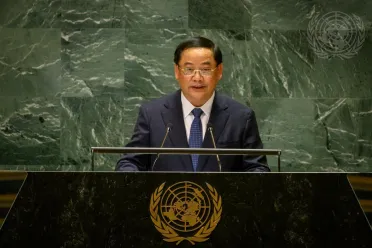Statement
Statement summary
SONEXAY SIPHANDONE, Prime Minister of the Lao People’s Democratic Republic, expressed concern over the ongoing armed conflict “that is gravitating towards spilling over the entire Middle East region”, welcoming all international efforts aimed at achieving a permanent ceasefire in Gaza, unhindered humanitarian access and rapid negotiation towards a peace agreement. Stating that many countries — including his own — “have experienced and suffered firsthand the consequences of war”, he stressed that the only way to solve disputes “is to begin with building mutual trust” accompanied by diplomatic negotiations based on respect for sovereignty, the Charter of the United Nations and international law. “It is my view that the application of unilateral coercive measures” violates the Charter’s principles and international law, he went on to say, joining his voice to those calling for an end to the economic embargo against Cuba and the removal of all such measures “against any sovereign State”.
Noting that his country will assume the Chairmanship of the Association of Southeast Asian Nations (ASEAN) in 2024 under a theme of “enhancing connectivity and resilience”, he said that this reflects his country’s aim to “turn itself from being a landlocked country to a regional connectivity hub”. The theme also tracks ASEAN’s common goal of building a more connected, integrated and resilient region that is capable of responding effectively to emerging challenges. He further pointed out, among other initiatives and plans, that ASEAN is accelerating Timor-Leste’s accession process towards admission as a full member “in the near future”. Turning to developments in Myanmar, he said that, as ASEAN Chair, the Lao People’s Democratic Republic continues to uphold the Association’s commitment to assist Myanmar in finding a “peaceful and durable solution to the ongoing problem” based on a process led and owned by that country.
He also noted his country’s commitment to achieve the SDGs through a focus on socioeconomic development, environmental protection and poverty reduction. Yet, while progress has been made towards the national SDG of “lives safe from unexploded ordnance”, he said that such ordnance “remains a major threat to the lives of the Lao people and poses obstacles to national development while hindering the progress of other SDGs”. He therefore called on the international community to provide predictable, adequate support to help the Government address this “long-overdue and challenging problem” in accordance with the Convention on Cluster Munitions. Insufficient funding, he continued, is also a main obstacle to implementing the SDGs as a whole, urging reform of the international financial architecture through collaboration between the UN development system, development partners and international financial institutions. Such reform must also promote developing countries’ participation in international economic decision-making, norm-setting and global economic governance.
Another key factor for accelerating national development efforts, he said, is promoting science, technology and innovation to facilitate “green growth and digitalization” that is environmentally friendly and to invest in carbon capture and storage. To this end, he called on the international community to facilitate access to — and transfer — relevant technology and innovation to help “leapfrog” development. “Human capital is another decisive factor,” he stressed, noting that his country has the youngest population in South-East Asia. The Government has invested in human-capital development to “reap the benefits of its demographic dividend”, and he noted summits organized in 2023 and 2024 aimed at enhancing education, basic health care and nutrition for the Lao people. Adding that his country will continue cooperation with Member States to contribute to the causes of maintaining peace, promoting prosperity, overcoming today’s challenges and achieving the SDGs, he said it does so to “provide enabling conditions for a bright future”.
Sonexay Siphandone, Prime Minister of the Lao People’s Democratic Republic, echoed the disproportionate impact on vulnerable nations, his being a landlocked, least developed country.
“Despite being one of the least emissions-polluting countries in the world, the Lao PDR, like many other countries, has encountered severe consequences of climate change and natural disasters,” he said.
Climate change impacts, notably. more frequent and devastating disasters, he noted, represent real threats to international peace and security, as do geo-political tensions, conflicts, economic crisis, and rising poverty.
They also imperil the achievement of Sustainable Development Goals (SDGs) and implementation of the 2030 Agenda for Sustainable Development.
“Notwithstanding the fact that the Lao PDR is landlocked, we stand ready to contribute to the international efforts to protect the environment, while calling for support measures to further increase adaptation capacity and resilience for responding to future impacts,” he declared.
Full statement
Read the full statement, in PDF format.
Photo

Previous sessions
Access the statements from previous sessions.
